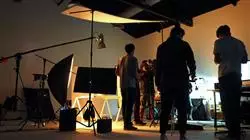University certificate
Accreditation/Membership

The world's largest faculty of journalism and communication”
Introduction to the Program
A comprehensive Professional master’s degreeof the highest quality, which will allow you to acquire the personal and professional work tools necessary to master the management of the audiovisual industry
The audiovisual industry is an industry in which the passage of time has become a process of strengthening and development without brake. At the present time, the proliferation of diverse workspaces and communication in this spectrum determine an extreme need for specific education to maintain competitiveness and get the business niche that ensures the viability of a project. This program has been developed to fully train you you in this field, with the reliability and seriousness of the largest online educational institution in the world.

The audiovisual industry is developing at a dizzying pace, feeding intensively on the social, economic and cultural changes of the international environment. Management in this context is the essential guideline to give real chances of success, in the practical sense of the term, to any project.
In order to be able to work in this field in a precise and solvent way, you will need a personal background of broad but specific knowledge in the different fields and contexts of the audiovisual sector.
This Professional Master's Degree has been developed with the clear and concrete objective of providing the necessary professional tools to be able to organize and manage the management processes of the different work fields involved. With this approach in, we will begin by covering the concepts of industry and culture, studying cultural journalism and the way it works.
The technical part, focused on the realization of the projects, from the theoretical and practical points of view, will lead you through the journey from the idea to the staging. This approach, which will give you theoretical knowledge and the ability to apply it in practice, will be present throughout the entire education in the different subjects. In this way, everything you will learn will be converted into real working skills that will allow you to boost your capacity intensively. Therefore, you will learn the structure of the audiovisual system and the way in which the production of this type of content contemplates its financing and its valuation of investment in costs and benefits.
Another relevant aspect refers more directly to the most creative part of the sector. Learn basics that determine the direction of actors in fiction and the creation of narrative discourse. This data will allow you to continue advancing towards the understanding of the cultural industry and the new communication models that are currently being developed. In this sense, an in-depth knowledge of the new genres and formats that are being used in TV is a must. A domain that will give you the necessary perspective to position it in your own way and reach your target audience.
Acquire the skills of an expert manager in the audiovisual industry"
This Professional master’s degree in MBA in Audiovisual Business Management contains the most complete and up-to-date program on the market. The most important features include:
- The latest technology in online teaching software
- A highly visual teaching system, supported by graphic and schematic contents that are easy to assimilate and understand
- Practical cases presented by practising experts
- State-of-the-art interactive video systems
- Teaching supported by telepractice
- Continuous updating and recycling systems
- Autonomous learning: full compatibility with other occupations
- Practical exercises for self-evaluation and learning verification
- Support groups and educational synergies: questions to the expert, debate and knowledge forums
- Communication with the teacher and individual reflection work
- Content that is accessible from any fixed or portable device with an Internet connection
- Supplementary documentation databases are permanently available, even after the program
A contextualized and real educational program that will allow you to put your learning into practice through new skills"
Our teaching staff is made up of working professionals. In this way we ensure that we deliver the educational update we are aiming for. A multidisciplinary team of professors prepared and experienced in different environments who will cover the theoretical knowledge in an efficient way, but, above all, who will put the practical knowledge derived from their own experience at the service of this program: one of its differential qualities.
This mastery of the subject is complemented by the effectiveness of the methodological design of this Professional master’s degree. Developed by a multidisciplinary team of e-learning experts, it integrates the latest advances in educational technology. This way, you will be able to study with a range of comfortable and versatile multimedia tools that will give you the operability you need in your education.
The design of this program is based on Problem-Based Learning: an approach that conceives learning as a highly practical process. To achieve this remotely, we will use telepractice: with the help of an innovative interactive video system, and learning from an expert you will be able to acquire the knowledge as if you were facing the scenario you are learning at that moment. A concept that will allow you to integrate and fix learning in a more realistic and permanent way.
The different scenarios of the management of the audiovisual industry developed with clarity and effectiveness to drive our students"

A practical and real program that will allow you to advance gradually and safely"
Why study at TECH?
TECH is the world’s largest online university. With an impressive catalog of more than 14,000 university programs available in 11 languages, it is positioned as a leader in employability, with a 99% job placement rate. In addition, it relies on an enormous faculty of more than 6,000 professors of the highest international renown.

Study at the world's largest online university and guarantee your professional success. The future starts at TECH”
The world’s best online university according to FORBES
The prestigious Forbes magazine, specialized in business and finance, has highlighted TECH as “the world's best online university” This is what they have recently stated in an article in their digital edition in which they echo the success story of this institution, “thanks to the academic offer it provides, the selection of its teaching staff, and an innovative learning method aimed at educating the professionals of the future”
A revolutionary study method, a cutting-edge faculty and a practical focus: the key to TECH's success.
The most complete study plans on the university scene
TECH offers the most complete study plans on the university scene, with syllabuses that cover fundamental concepts and, at the same time, the main scientific advances in their specific scientific areas. In addition, these programs are continuously being updated to guarantee students the academic vanguard and the most in-demand professional skills. In this way, the university's qualifications provide its graduates with a significant advantage to propel their careers to success.
TECH offers the most comprehensive and intensive study plans on the current university scene.
A world-class teaching staff
TECH's teaching staff is made up of more than 6,000 professors with the highest international recognition. Professors, researchers and top executives of multinational companies, including Isaiah Covington, performance coach of the Boston Celtics; Magda Romanska, principal investigator at Harvard MetaLAB; Ignacio Wistumba, chairman of the department of translational molecular pathology at MD Anderson Cancer Center; and D.W. Pine, creative director of TIME magazine, among others.
Internationally renowned experts, specialized in different branches of Health, Technology, Communication and Business, form part of the TECH faculty.
A unique learning method
TECH is the first university to use Relearning in all its programs. It is the best online learning methodology, accredited with international teaching quality certifications, provided by prestigious educational agencies. In addition, this disruptive educational model is complemented with the “Case Method”, thereby setting up a unique online teaching strategy. Innovative teaching resources are also implemented, including detailed videos, infographics and interactive summaries.
TECH combines Relearning and the Case Method in all its university programs to guarantee excellent theoretical and practical learning, studying whenever and wherever you want.
The world's largest online university
TECH is the world’s largest online university. We are the largest educational institution, with the best and widest online educational catalog, one hundred percent online and covering the vast majority of areas of knowledge. We offer a large selection of our own degrees and accredited online undergraduate and postgraduate degrees. In total, more than 14,000 university degrees, in eleven different languages, make us the largest educational largest in the world.
TECH has the world's most extensive catalog of academic and official programs, available in more than 11 languages.
Google Premier Partner
The American technology giant has awarded TECH the Google Google Premier Partner badge. This award, which is only available to 3% of the world's companies, highlights the efficient, flexible and tailored experience that this university provides to students. The recognition as a Google Premier Partner not only accredits the maximum rigor, performance and investment in TECH's digital infrastructures, but also places this university as one of the world's leading technology companies.
Google has positioned TECH in the top 3% of the world's most important technology companies by awarding it its Google Premier Partner badge.
The official online university of the NBA
TECH is the official online university of the NBA. Thanks to our agreement with the biggest league in basketball, we offer our students exclusive university programs, as well as a wide variety of educational resources focused on the business of the league and other areas of the sports industry. Each program is made up of a uniquely designed syllabus and features exceptional guest hosts: professionals with a distinguished sports background who will offer their expertise on the most relevant topics.
TECH has been selected by the NBA, the world's top basketball league, as its official online university.
The top-rated university by its students
Students have positioned TECH as the world's top-rated university on the main review websites, with a highest rating of 4.9 out of 5, obtained from more than 1,000 reviews. These results consolidate TECH as the benchmark university institution at an international level, reflecting the excellence and positive impact of its educational model.” reflecting the excellence and positive impact of its educational model.”
TECH is the world’s top-rated university by its students.
Leaders in employability
TECH has managed to become the leading university in employability. 99% of its students obtain jobs in the academic field they have studied, within one year of completing any of the university's programs. A similar number achieve immediate career enhancement. All this thanks to a study methodology that bases its effectiveness on the acquisition of practical skills, which are absolutely necessary for professional development.
99% of TECH graduates find a job within a year of completing their studies.
Professional Master's Degree in Audiovisual Business Management
The audiovisual industry has grown exponentially in recent years due to the rise of digital media in social, economic and cultural environments. To improve the quality of its products and organizational processes, it needs highly trained personnel in the processes of creation, production and distribution of cultural services and goods, as well as in the new communication models that are in development. This implies a great job opportunity for professionals related to this area of knowledge. For this reason, at TECH Global University we developed this Professional Master's Degree in Audiovisual Business Management, a postgraduate program that will allow you to acquire a high qualification to excel in this field.
Learn how to create and develop successful audiovisual products
.
The main objective of this program is to provide students with a complete and updated curriculum that allows them to specialize and deepen their understanding of the audiovisual industry in business management. Thus, through different modules, the most relevant topics of this discipline will be studied, such as the structure and production of audio and visual systems, cultural journalism and the new business models of communication. Likewise, professionals will be trained to participate in the processes of creation, management and promotion of audiovisual products and to guide the development of the audiovisual media. All this so that they can participate with skill and efficiency in the daily practice of their work.
Study at the largest digital university in the world
??
At TECH Global University we have a wide range of specialization programs that stand out for their high academic level and the use of innovative methodologies for online education. Those who wish to consolidate their knowledge in the management of audiovisual companies will be able to understand and make use of the most relevant concepts, notions and topics to create products that please the public for their quality and that are successful in the medium. Studying at the world's largest digital university can be the next step in your professional career.







